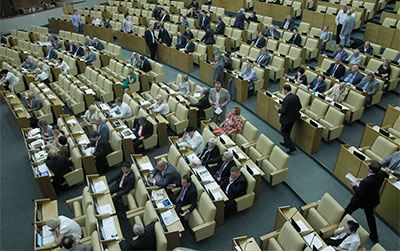New York, July 11, 2012–The Committee to Protect Journalists is concerned over Russia’s moves to return defamation to the criminal code, and calls on the parliament to reject the restrictive bill on its second reading.
The ruling United Russia party introduced the bill to parliament on Friday and deputies approved it on a first reading today–drawing criticism from the opposition, who said the bill was rushed and did not undergo meaningful debate, local press reports said. The bill must past three readings in the parliament’s lower house, the State Duma, before going to the upper house and finally to the president. Once the State Duma passes a bill, the role of the upper house, or Federation Council, is mostly symbolic.
The move to make defamation a criminal offense is a step backwards for Russia. In November, parliament voted to decriminalize libel and insult in a move widely perceived as part of then-President Dmitry Medvedev’s liberalization policies. According to the independent news agency Regnum, the new bill allows for imprisonment of up to five years, and a fine for moral damages up to 500,000 rubles (US$15,300) for those found guilty of defamation.
Russian Ombudsman Vladimir Lukin and Mikhail Fedotov, head of the presidential human rights council, met with President Vladimir Putin on Tuesday and asked him to reject the bill. Putin said he would endorse the bill but would urge the removal of imprisonment as a penalty, the Russian news agency RIA Novosti reported.
“The criminalization of speech would be a significant step backward for freedom in Russia, and we call on parliament and President Putin to reject this bill entirely,” CPJ Europe and Central Asia Program Coordinator Nina Ognianova said. “The recent rush to pass bills that restrict fundamental human rights is misguided and casts a shadow on the president’s commitment to democratic values.”
The defamation bill is viewed as part of authorities’ response to the recent waves of opposition protests in Russia, the independent news website Gazeta reported. A number of restrictive bills were passed or introduced in recent weeks, clearly aimed at reining in dissent and curbing the work of civil society in the country. Last month, ignoring domestic and international outcry, Putin signed into law a bill that imposed exorbitant fines on those who hold unsanctioned protests. Over the past week alone, parliament passed new amendments on a first reading to Russia’s notoriously restrictive law on non-government organizations (NGOs), which label NGOs that receive international funding “foreign agents” and burden them with prohibitive reporting requirements. In addition, parliament approved in its final reading a new Internet bill that, critics say, will allow authorities to shut down websites they deem undesirable.
